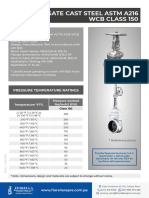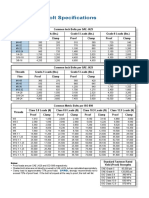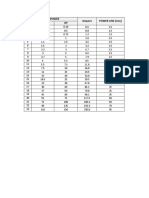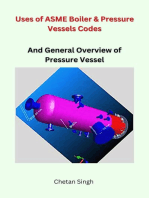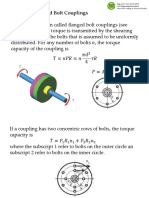Torque
Torque
Uploaded by
staedtlerpCopyright:
Available Formats
Torque
Torque
Uploaded by
staedtlerpOriginal Description:
Copyright
Available Formats
Share this document
Did you find this document useful?
Is this content inappropriate?
Copyright:
Available Formats
Torque
Torque
Uploaded by
staedtlerpCopyright:
Available Formats
30
Torque & Fastener Matching Information
In most race car chassis and aircraft airframe applications, the bolts used are loaded in shear. The torque values
given in the NAS torque chart (opposite page) are adequate and appropriate for this type of usage. For aerospace bolt
applications subjected to high tensile loadings and for aerospace nuts and bolts matched to fasteners of other grades
and thread classes, see the notes below:
A.) For applications requiring high installation torque values and using standard NAS bolts: achievable torque is
dependent on plating, length of thread engagement, class of mating threads and lubricant (if any). For maximum
fatigue resistance and clamping force in the bolted assembly, we want to produce a level of installed tensile stress that
is just below the yield strength of the bolt material (typically around 85% of the ultimate tensile strength). Achieving
this ensures that the stresses encountered in the assembly/tightening process will be the most the bolt ever sees. At
the yield point, the bolt will undergo “plastic” deformation (permanent stretch). Bolts for critical applications should
be test-torqued to determine the point of measurable permanent stretch. As a rule, approximately 90% of this
value will give the best performance in a bolted assembly. Example: ’93 INDY-LOLA ring gear bolts NAS 1307-4H
– with light lubrication, these bolts stretch permanently on a consistent basis between 105 and 110 ft/lbs of installed
torque. 90% of this value gives an assembly torque of 95 ft/lbs.
B.) The mating of aerospace spec (MS•NAS•AN) bolts and nuts to fasteners of other specifications and thread classes
can cause problems. Nut splitting failures are primarily caused by overtorquing and/or thread class mismatches.
Generally, NAS wrenching torque values should be reduced when aerospace nuts are matched with non-aerospace
bolts or studs. Wrench torque values in the NAS nut tables below are achieved under laboratory conditions using
aerospace spec bolts (Class 3 threads) of higher strength than the nuts they are mated to. THE TABLES DO NOT
STATE, NOR SHOULD ONE INFER THAT THIS PERFORMANCE CAN BE DUPLICATED WITH OTHER TYPES OF
FASTENERS AND/OR CLASSES OF THREADS. For applications requiring high clamping forces, 12 point nuts should
be used whenever possible. Their greater thread contact area and higher rated strength make higher wrenching torque
values possible. As a general rule, the wrenching torque values for aerospace spec nuts should be reduced
approximately 25% as a starting point when these nuts are mated to non-aerospace bolts or studs.
WRENCH TORQUE, INCH POUNDS WRENCH TORQUE, INCH POUNDS
NUT SIZE
160 KSI NAS NUTS * 180 & 220 KSI NAS NUTS *
#6 - 32 20 N/A
#8 - 32 30 N/A
#10 - 32 60 70 / 85
1/4 - 28 150 170 / 210
5/16 - 24 330 370 / 450
3/8 - 24 530 600 / 730
7/16 - 20 825 880 / 1100
1/2 - 20 1125 1225 / 1400
9/16 - 18 1550 1700 / 2000
5/8 - 18 2000 2200 / 2600
3/4 - 16 N/A 3800 / 4400
* Above values for alloy steel nuts. For A286 stainless multiply them by 0.694
Coast Fabrication, Inc. Ph: (714) 842-2603 Fax: (714)847-1824 info@coastfab.com
31
Recommended Torque Values for Nut & Bolt Combinations
for shear loads without lubrication
Steel Tension Bolts Steel Tension Bolts Aluminum Bolts
AN3 through AN20 MS20004 through MS20024
AN42 through AN49 NAS144 through NAS158 AN3DD through AN20DD
AN73 through AN81 NAS333 through NAS340 AN173DD through AN186DD
MS20033 through MS20046 NAS583 through NAS590 AN509DD
MS20073 and MS20074 NAS624 through NAS644 AN525DD
AN509 NAS1303 through NAS1320 MS27039D
AN525 NAS172 and NAS174 MS24694DD
MS24694 and MS27039 NAS517
Steel Nuts Steel Nuts Aluminum Nuts
Tension Shear Tension Shear Tension Shear
AN310 & AN315 AN310 & AN315
AN363 & AN365 AN320 AN363 & AN365 AN320
NAS1021 AN364 NAS1021 AN364 AN310D AN320D
MS20365 NAS1022 MS20365 NAS1022 AN365D AN364D
MS21042 MS17826 MS21042 MS17826 NAS1021D NAS1022D
MS21045 MS20364 MS21045 MS20364
NAS679 NAS679
Torque Limits for Fine Threaded Series in Inch-Pounds
Series From To From To From To From To From To From To
#8-36 12 15 7 9 5 10 3 6
#10-32 20 25 12 15 25 30 15 20 10 15 5 10
1/4-28 50 70 30 40 80 100 50 60 30 45 15 30
5/16-24 100 140 60 85 120 145 70 90 40 65 25 40
3/8-24 160 190 95 110 200 250 120 150 75 110 45 70
7/16-20 450 500 270 300 520 630 300 400 180 280 110 170
1/2-20 480 690 290 410 770 950 450 550 280 410 160 260
9/16-18 800 1000 480 600 1100 1300 650 800 380 580 230 360
5/8-18 1100 1300 660 780 1250 1550 750 950 550 670 270 420
3/4-16 2300 2500 1300 1500 2650 3200 1600 1900 950 1250 560 880
7/8-14 2500 3000 1500 1800 3550 4350 2100 2600 1250 1900 750 1200
1-14 3700 4500 2200 3300 4500 5500 2700 3300 1600 2400 950 1500
1 1/8-12 5000 7000 3000 4200 6000 7300 3600 4400 2100 3200 1250 2000
1 1/4-12 9000 11000 5400 6600 11000 13400 6600 8000 3900 5600 2300 3650
Customized & Modified Aircraft & Aerospace Bolts
Shortening, drilling, grinding, machining, thread rolling to your print or specifications. From standard AN•MS•NAS
fasteners. Contact us for technical assistance and recommendations. Combinations of the above operations can be
simple or elaborate. For example, a 7/16 diameter MS21250 bolt (pp. 22-23) was used to manufacture custom, rolled-
thread (J-type), metric (M10 x 1.0) transmission bolts with heads drilled for safety wire and head base diameter turned
down for clearance. Total turn around time was four weeks for a fastener of higher quality than the German-made
equivalent at one-third to one-half the price.
Coast Fabrication, Inc. Ph: (714) 842-2603 Fax: (714)847-1824 info@coastfab.com
You might also like
- Nasm21209 AiaDocument8 pagesNasm21209 Aiastaedtlerp100% (3)
- 6-Speed Manual Gearbox 0A6, Four-Wheel DriveDocument200 pages6-Speed Manual Gearbox 0A6, Four-Wheel Driveberenice togaNo ratings yet
- Star Core 6Document2 pagesStar Core 6jmur10No ratings yet
- Pantograph Project ReportDocument66 pagesPantograph Project ReportPRAVIN KUMAR N80% (10)
- Acceptable MethodDocument5 pagesAcceptable Methodfaisal jawadNo ratings yet
- Flanged "Y" Strainers Steel / Stn. Stl. - 300YF Series: Ratings MaterialsDocument1 pageFlanged "Y" Strainers Steel / Stn. Stl. - 300YF Series: Ratings MaterialsNitin ZoreNo ratings yet
- Capscrew Markings and Torqure ValuesDocument4 pagesCapscrew Markings and Torqure ValuesNaing Min HtunNo ratings yet
- Expansion Joints: Axial Lateral Hinged AngularDocument4 pagesExpansion Joints: Axial Lateral Hinged AngularnawajhaNo ratings yet
- Drive Belt TensionDocument2 pagesDrive Belt TensionRasoolKhadibiNo ratings yet
- Miggy and Railtrac - PTDocument33 pagesMiggy and Railtrac - PTezequieltoniNo ratings yet
- Butterfly Valves EgeplastDocument4 pagesButterfly Valves EgeplastdsyashankaNo ratings yet
- AdaptoareDocument2 pagesAdaptoareIlie NitoiuNo ratings yet
- Reference Card PDFDocument2 pagesReference Card PDFroshan mungurNo ratings yet
- AMRI ISORIA 16 Type Series Booklet DataDocument20 pagesAMRI ISORIA 16 Type Series Booklet Datarudiskw456No ratings yet
- Technical Information APP. 5 Field of Application:: 6 Bar/10 Bar /16 BarDocument2 pagesTechnical Information APP. 5 Field of Application:: 6 Bar/10 Bar /16 BarVignesh BharathiNo ratings yet
- SYT Marine Systems TrelleborgDocument9 pagesSYT Marine Systems TrelleborgMd AzaharyNo ratings yet
- Practicas Standar KingDocument5 pagesPracticas Standar Kingjesus francoNo ratings yet
- Gate Cast Steel Astm A216 WCB Class 150: Pressure Temperature RatingsDocument2 pagesGate Cast Steel Astm A216 WCB Class 150: Pressure Temperature RatingsJavier Hinojosa Garrido LeccaNo ratings yet
- Fountom Anchor ChainDocument9 pagesFountom Anchor Chainariyanmolla2004No ratings yet
- Technical Information APP. 5 Field of Application:: 6 Bar/10 Bar /16 BarDocument2 pagesTechnical Information APP. 5 Field of Application:: 6 Bar/10 Bar /16 BarAshok SureshNo ratings yet
- Fabricated "Y" Strainers: Features OptionsDocument2 pagesFabricated "Y" Strainers: Features OptionsGourav SharmaNo ratings yet
- Klein UNIBIT StepTech PageDocument4 pagesKlein UNIBIT StepTech Pagemastergeneral11390No ratings yet
- Bolts and Nuts Torque Table1Document2 pagesBolts and Nuts Torque Table1Ibama MirillaNo ratings yet
- Detroit Diesel 92 Service ManualDocument167 pagesDetroit Diesel 92 Service ManualVer Ghom100% (1)
- PG-1028-T (HOS) General Data and Specifications: Table 5-3. Prestress Levels For HOSDocument4 pagesPG-1028-T (HOS) General Data and Specifications: Table 5-3. Prestress Levels For HOSAnkush SehgalNo ratings yet
- Expansion: JointDocument40 pagesExpansion: JointVignesh NadimuthuNo ratings yet
- HydrapumpsremanDocument1 pageHydrapumpsremanAlexander InfanteNo ratings yet
- S3 Energy Stock Format Month of January (Raw Material of Mechanical) - 1Document29 pagesS3 Energy Stock Format Month of January (Raw Material of Mechanical) - 1Prince MittalNo ratings yet
- A. K. Steels: Cutting Rate ListDocument2 pagesA. K. Steels: Cutting Rate ListRam PatelNo ratings yet
- Safety Data Bolt Strengths IdentificationDocument1 pageSafety Data Bolt Strengths IdentificationSameer KulkarniNo ratings yet
- Cmpl-Bolt and Torque Specifications UsDocument3 pagesCmpl-Bolt and Torque Specifications UsYanina CamonesNo ratings yet
- Standarisasi KabelDocument44 pagesStandarisasi Kabeladzan isaacNo ratings yet
- Miggy and Railtrac - Notas - PTDocument11 pagesMiggy and Railtrac - Notas - PTezequieltoniNo ratings yet
- Flared Separable FittingDocument9 pagesFlared Separable FittingbenNo ratings yet
- Check Swing Cast Steel A216 WCB Class 150: Pressure Temperature RatingsDocument2 pagesCheck Swing Cast Steel A216 WCB Class 150: Pressure Temperature Ratingsbreyca4 bcrNo ratings yet
- NTPC FGD Talcher: Raw Material Requirement - 05.04.2022: S. No. Grade Thick/Profile (MM) Width (MM) Length (MM)Document9 pagesNTPC FGD Talcher: Raw Material Requirement - 05.04.2022: S. No. Grade Thick/Profile (MM) Width (MM) Length (MM)Tamil Arasu SNo ratings yet
- Consteel Catalogue PLATES PlatesDocument4 pagesConsteel Catalogue PLATES PlatesjirsamaNo ratings yet
- Crompton Price ListDocument6 pagesCrompton Price ListVarun MalhotraNo ratings yet
- Ficha Tecnica Junta Caucho Epdm - Ec-FlexDocument1 pageFicha Tecnica Junta Caucho Epdm - Ec-FlexericNo ratings yet
- Noreva-CatalogueDocument24 pagesNoreva-CatalogueAntonio CardosoNo ratings yet
- Dasco HvacDocument35 pagesDasco HvacrafaelNo ratings yet
- Industry Guidelines: Metal Backing Flanges For Use With Polyethylene (Pe) Pipe Flange AdaptorsDocument17 pagesIndustry Guidelines: Metal Backing Flanges For Use With Polyethylene (Pe) Pipe Flange AdaptorsAnthonyNo ratings yet
- Consteel Catalogue PLATES ChequeredPlatesDocument3 pagesConsteel Catalogue PLATES ChequeredPlatesrichard richNo ratings yet
- Round Cutting ListDocument2 pagesRound Cutting ListSachin PatelNo ratings yet
- Drive Belt Spec QSK45 and QSK60Document2 pagesDrive Belt Spec QSK45 and QSK60andrianusmathius.uNo ratings yet
- 4 ClusterDocument1 page4 Clusterabelbernardo73No ratings yet
- NO Power Ampere Power Line (MM) KW HPDocument7 pagesNO Power Ampere Power Line (MM) KW HPMarto CelorNo ratings yet
- Gre Bolt Length-2000m 2432Document20 pagesGre Bolt Length-2000m 2432ABDUL KADHARNo ratings yet
- WWW Rfshydraulics Com Ferrule Fittings HTMLDocument10 pagesWWW Rfshydraulics Com Ferrule Fittings HTMLMuhammad HafizuddinNo ratings yet
- Mechanical and Physical PropertiesDocument1 pageMechanical and Physical PropertiesAnonymous cuOIjrLINo ratings yet
- GIW Technical Series: Pipe Flange BoltsDocument4 pagesGIW Technical Series: Pipe Flange BoltsTravis SkinnerNo ratings yet
- V31 Flanged OSY Gate ValveDocument1 pageV31 Flanged OSY Gate ValveRolando CerezoNo ratings yet
- Properties of Stainless SteelsDocument22 pagesProperties of Stainless Steelsngoclinh87No ratings yet
- Calculo OrçamentoDocument308 pagesCalculo OrçamentoFernando BarbosaNo ratings yet
- Instrucciones Montaje y PlanosDocument8 pagesInstrucciones Montaje y PlanosTrina HernandezNo ratings yet
- PAK AMIN PARAMETRIkDocument525 pagesPAK AMIN PARAMETRIkandratheshithandNo ratings yet
- 1091 Bombas CentrifugasDocument17 pages1091 Bombas CentrifugasEugenio GomezNo ratings yet
- Guia de Materiales - MatricesDocument11 pagesGuia de Materiales - MatricesGracielaNo ratings yet
- Amg RTJ Data PDFDocument8 pagesAmg RTJ Data PDFsiswoutNo ratings yet
- CD Section 111516Document29 pagesCD Section 111516Alex MendozaNo ratings yet
- SVT - Casting Valve-Compressed PDFDocument32 pagesSVT - Casting Valve-Compressed PDFHoang Mai HoaNo ratings yet
- Carbon Hollow Bar ST 52Document2 pagesCarbon Hollow Bar ST 52JeganeswaranNo ratings yet
- CS-29 Amendment 7Document225 pagesCS-29 Amendment 7staedtlerpNo ratings yet
- Quasi-Static Three-Point Beniding of Carbon Fiber Sandwich Beams With Square Honeycomb CoresDocument15 pagesQuasi-Static Three-Point Beniding of Carbon Fiber Sandwich Beams With Square Honeycomb CoresstaedtlerpNo ratings yet
- Numerical Modelling of Nomex Honeycomb C PDFDocument12 pagesNumerical Modelling of Nomex Honeycomb C PDFstaedtlerpNo ratings yet
- Preparation of Stress Analysis Reports (8594001)Document14 pagesPreparation of Stress Analysis Reports (8594001)douglascoombsNo ratings yet
- Fan Supersonic Flutter: Prediction and Test Ar A Ys S: Procurement Executive, Ministry of DefenceDocument24 pagesFan Supersonic Flutter: Prediction and Test Ar A Ys S: Procurement Executive, Ministry of DefencestaedtlerpNo ratings yet
- Click BondDocument4 pagesClick BondstaedtlerpNo ratings yet
- AN3-3A SpecDocument2 pagesAN3-3A Specstaedtlerp100% (1)
- Adhesive Bonding ECSS E HB 32 21A 20march2011Document461 pagesAdhesive Bonding ECSS E HB 32 21A 20march2011Li-chung Jea100% (1)
- Ms33537e PDFDocument11 pagesMs33537e PDFstaedtlerpNo ratings yet
- Numerical Modelling of Nomex Honeycomb C PDFDocument12 pagesNumerical Modelling of Nomex Honeycomb C PDFstaedtlerpNo ratings yet
- Spiralock Wire Thread Insert Hole Drilling Specifications 0Document2 pagesSpiralock Wire Thread Insert Hole Drilling Specifications 0staedtlerpNo ratings yet
- Din 8140 3 1993 PDFDocument5 pagesDin 8140 3 1993 PDFstaedtlerpNo ratings yet
- FSI in VWT 2017Document23 pagesFSI in VWT 2017staedtlerpNo ratings yet
- Structural Analysis of Aircraft Wing J Nose Panel Using Mono and Multi Core Composite MaterialsDocument6 pagesStructural Analysis of Aircraft Wing J Nose Panel Using Mono and Multi Core Composite MaterialsstaedtlerpNo ratings yet
- Wurth HelicoilDocument32 pagesWurth HelicoilstaedtlerpNo ratings yet
- CS-27 Amdt 6 PDFDocument168 pagesCS-27 Amdt 6 PDFstaedtlerpNo ratings yet
- Din 8140 1 PDFDocument13 pagesDin 8140 1 PDFstaedtlerpNo ratings yet
- PDFDocument221 pagesPDFstaedtlerpNo ratings yet
- TFM-138B: VHF/FM Airborne Transceiver (S/N's 1500 Onwards Use F14 Software and Up)Document48 pagesTFM-138B: VHF/FM Airborne Transceiver (S/N's 1500 Onwards Use F14 Software and Up)staedtlerpNo ratings yet
- Car-Part3 1949 PDFDocument70 pagesCar-Part3 1949 PDFstaedtlerpNo ratings yet
- Part 3-Airplane Airworthiness Normal, Utility, and Acrobatic CategoriesDocument34 pagesPart 3-Airplane Airworthiness Normal, Utility, and Acrobatic CategoriesstaedtlerpNo ratings yet
- 3.1 Bolted Joint DesignDocument15 pages3.1 Bolted Joint Designssn MLNo ratings yet
- Screw Threads #2Document221 pagesScrew Threads #2boo huNo ratings yet
- FJ400D Kawasaki Service Repair Manual 99924 2066 01Document129 pagesFJ400D Kawasaki Service Repair Manual 99924 2066 01Jose Laureano Gonzalez MartinezNo ratings yet
- 53 114 An EbsDocument92 pages53 114 An EbsОлег Дочило100% (2)
- DSS Assignment Bolted ConnectionDocument9 pagesDSS Assignment Bolted ConnectionSalmankhan PathanNo ratings yet
- W01 358 6900 Firestone Double Convoluted Air SpringDocument29 pagesW01 358 6900 Firestone Double Convoluted Air SpringMROstop.comNo ratings yet
- Draft: Mechanical AssemblyDocument22 pagesDraft: Mechanical Assemblysarath6725No ratings yet
- MC 10226018 9999Document37 pagesMC 10226018 9999Jon LoebelNo ratings yet
- Investigation of High-Strength Bolt-Tightening Verification TechniquesDocument51 pagesInvestigation of High-Strength Bolt-Tightening Verification TechniquesTrung Trần BảoNo ratings yet
- Expo 2.4Document27 pagesExpo 2.4Percy RojasNo ratings yet
- Audi A1 Tdi 3 Cil (CUSB)Document335 pagesAudi A1 Tdi 3 Cil (CUSB)gume pesaNo ratings yet
- Design of Steel StructuresDocument129 pagesDesign of Steel StructuresFinney Wilson100% (3)
- Doosan - 02022015164559 - 32 - 46553449 - Operation and Maintenance ManualDocument64 pagesDoosan - 02022015164559 - 32 - 46553449 - Operation and Maintenance ManualHenry Diaz VelasquezNo ratings yet
- 02 Bolt TighteningDocument12 pages02 Bolt TighteningrijalharunNo ratings yet
- Powerrex BulletPro-BP40M-2-post-clear-floor-lift-4-ton-240V-user-manualDocument18 pagesPowerrex BulletPro-BP40M-2-post-clear-floor-lift-4-ton-240V-user-manualCykhong KhongNo ratings yet
- Lecture - 04 Bolted ConnectionsDocument59 pagesLecture - 04 Bolted Connectionshammads88No ratings yet
- CSR/Technicians Inspection InstructionsDocument8 pagesCSR/Technicians Inspection InstructionsLacatusu MirceaNo ratings yet
- RFS 1.8mDocument13 pagesRFS 1.8mMarius Tresor EdiboussieNo ratings yet
- 18 Hofmann Hofnuts Brochure A4Document2 pages18 Hofmann Hofnuts Brochure A4Jorge VillalobosNo ratings yet
- I-Et-3010.00-1200-200-P4x-116 - 0-Requirements For Bolted JointsDocument21 pagesI-Et-3010.00-1200-200-P4x-116 - 0-Requirements For Bolted JointsMarcelo GardengkiNo ratings yet
- T78u PDFDocument1 pageT78u PDFRenny DevassyNo ratings yet
- MDB Lesson 6 Flanged Bolt CouplingsDocument9 pagesMDB Lesson 6 Flanged Bolt Couplingspoliman2017100% (1)
- Luk Dual Mass FlywheelDocument48 pagesLuk Dual Mass FlywheeljurjitoNo ratings yet
- Tillt-Up Technical HandbookDocument79 pagesTillt-Up Technical Handbooktttmm100% (1)
- Muna 1234Document2 pagesMuna 1234shadowsamaNo ratings yet
- New Holland D150B Crawler Dozer Service Repair ManualDocument21 pagesNew Holland D150B Crawler Dozer Service Repair ManualggjjjjotonesNo ratings yet
- Frederick PDFDocument56 pagesFrederick PDFAndré Luiz NogueiraNo ratings yet
- Bolt Tightening StandardsDocument5 pagesBolt Tightening Standardshilbert_garlando1112No ratings yet

















